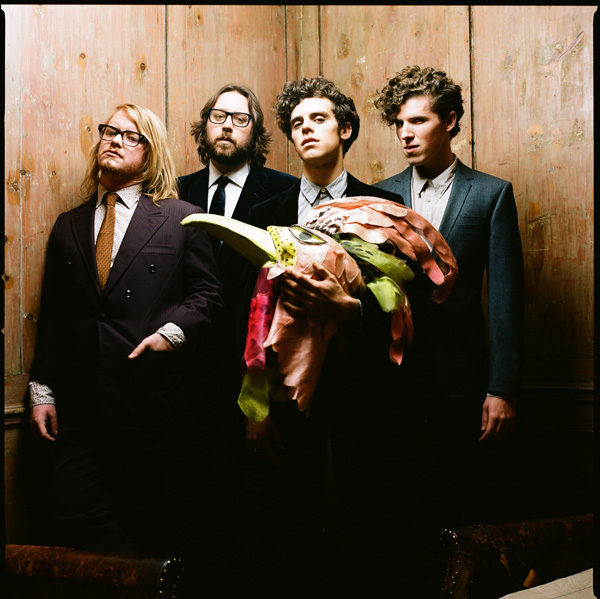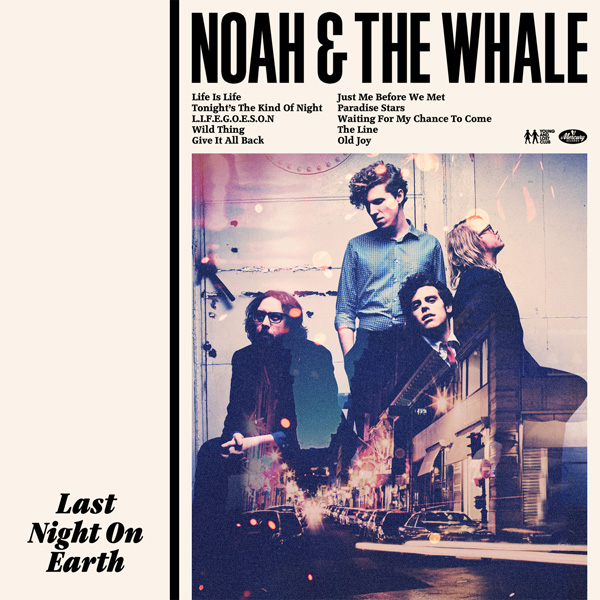I’m just gonna say it: Noah & the Whale’s debut album, Peaceful, the World Lays Me Down, is one of my favorite albums of the decade. No shame, no caveats, no qualifiers. Not only is it an emotionally candid album (sometimes painfully so), with some of singer/songwriter Charlie Fink’s most personal lyrics, but it is also simultaneously catchy and poignant — not an easy feat for a piece of indie pop music. It’s not that their followup The First Days of Spring didn’t match, it was just clear that Fink was at a different place in time — notably going through some well documented personal love loss. Now Noah & the Whale are back with their third long play, the markedly more mature Last Night on Earth. Although the album began its life when Fink hermited himself up in a synagogue in East London, through the process he began an assiduous study of some American rock legends, guys like Tom Petty, Bruce Springsteen, Lou Reed and Tom Waits. Artists who are more than just singers or writers, but proper storytellers. And while Fink has clearly always had a strong talent for penning a touching 4-minute biopic, on Last Night on Earth he takes it to a new level. (Really his erudite bent should be easy to discern, he did after all name the band after his hero, the terminally literate filmmaker Noah Baumbach and his most famous work, The Squid & the Whale.) So when we had the chance to talk to one of Charlie’s founding bandmates, fiddle player Tom Hobden, we jumped at the opportunity. Enjoy the interview below, and if you want to pick up Noah & the Whale’s latest LP, Last Night on Earth, jump over HERE. It’s a well spent $8.
What’s the songwriting process like for you guys? There’s a perception that Noah & the Whale is Charlie’s project. Are you guys all involved in the songwriting process, or does Charlie come in with almost finished tracks? Like does he hold court with the grip of an African tyrant, or is the process very democratic?
Charlie is the primary songwriter in the band. He’ll come along with lyrics and a rough skeleton of a song and we’ll all get involved in fleshing it out. He doesn’t really have the demeanor of an African tyrant but it’s certainly not Ancient Athens…
There is a very literary vibe to Noah & the Whale, even down to naming your band after an erudite indie film director. Do you feel pigeonholed by being thought of as “intellectual”, or does the cerebral level of your fans allow you to be yourselves without ever having to dumb down your sound or lyrics?
We certainly take influence from many poets, writers and directors. I wouldn’t say we felt pigeon-holed by this because after all so many bands write in that same way. Songs appeal to fans for many reasons; some dig the lyrics, others just like them for the melody. It’s as important to connect with someone who’s going through tough times and finds solace in our music as it is to connect with the kid dancing furiously around their parents’ living room.
What’s in the immediate plans for you guys these next couple months, say until end of summer?
We have a very busy run now up until December where we are touring all over the world. The next couple of months involve American, European and UK tours. We spent last summer recording the album so this year we are playing a huge amount of festivals, including Reading/Leeds, Green Man, Benicassim and Fuji Rock to name but a few. It’s good to be busy!
“Tonight’s the Kind of Night” video, and hit the Jump to continue reading our interview with Noah & the Whale’s illustrious fiddle player Tom Hobden…
“The seeds were sown at the synagogue and later blossomed in Venice Beach. We were able to witness first hand the kind of romance and excitement we were imagining on the album by recording in surroundings such as those…”
When September rolls around, what would you like to look back on the previous 5 months and have achieved?
It’s important to aim big. As I said previously, this is a touring year for us. We want nothing less than to give people the best night of their lives!
There was a prominent shift in your sound between your first two records, and with this one there’s another major shift — do you think Last Night On Earth is more cohesive with either of the two past records, or is it another major leap away from them?
I think this record is a move in a direction predetermined by our previous albums. We have become ever more self-assured in the studio and it was a real opportunity to test ourselves. We are very instinctive as a band and don’t like to sit in a comfort zone at all because it is then that you can become lax and repetitive. Collectively, our taste in music changes all the time: we were aware of “greats” such as Petty, Springsteen and Prince but had never appreciated them for their full worth. It feels like this record is an appraisal of our musical tastes here and now
You recorded Last Night On Earth in Venice Beach — what was that like? What did it add to the sound of the album?
It was obviously rather brilliant recording in Venice Beach. We made the record in a studio which allegedly belonged to Bob Dylan in the seventies and which Jason Lader, our co-producer, was based. It was a stone’s throw from the beach so whenever we hit a tough spot in recording we could take a refreshing dip and get right back on track. We demoed the record in a converted synagogue in East London and had a pretty clear idea of how we wanted the album to turn out. Lots of sounds from those demoes were used later on.
That’s really interesting, so the album had its rough genesis in London, but was then manifested in a studio in Venice Beach very different worlds. In some ways very similar (erudite, liberal, creative), and in other ways polar opposites (climate, American vs European, beach town vs metropolis). Do you sense that the music transformed at all by your physical transference from a synagogue in East London to a beach studio in Venice?
Our vision of the album’s final state was resolute throughout the year and we always expected that the demos we had made in London would transform into something new. The seeds were sown at the synagogue and later blossomed in Venice Beach. I guess we were able to witness first hand the kind of romance and excitement which we were imagining on the album by recording in surroundings such as those; working out of Venice Beach, taking road trips up to Ojai, meeting many great musicians; it was a month-long adventure for us which was always going to be reflected in the music we were making.
What was your favorite place to visit in Venice — be it a store, boutique, restaurant, crackhouse, gallery, street corner, etc?
We are big foodies in NATW so naturally our favourite place in Venice Beach was a restaurant called Gjelina’s. It’s a very cool place on the main street there, Abbot Kinney. The fried okra is a must!
Wow — Gjelina’s right next to our secret headquarters at The Meadows. That place could very well be the best restaurant in LA — fried okra rules! So seriously, what’s it like being the fiddle player of a rock band?
I think I’m lucky being the fiddle player in a rock band. I can add another dimension to the more typical rock sound and have a lot of freedom in what I do.
And lastly, if you were lost in a supermarket, in what aisle would we most likely find you?
If I were lost in a supermarket right now, you’d find me slumped in the wine aisle, sipping on a Stone’s Ginger Wine. An almighty summer beverage.
The album cover to Last Night On Earth…


